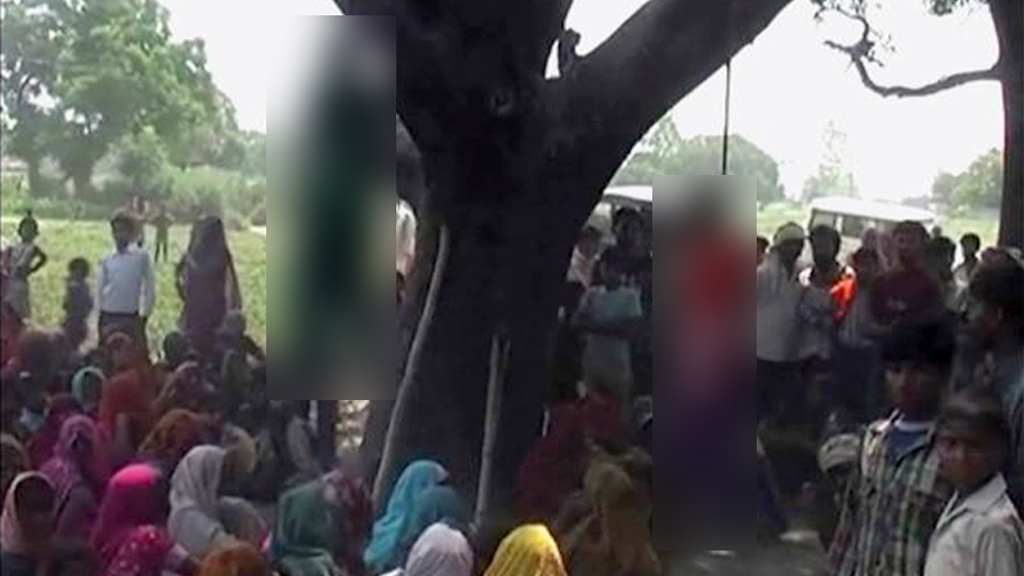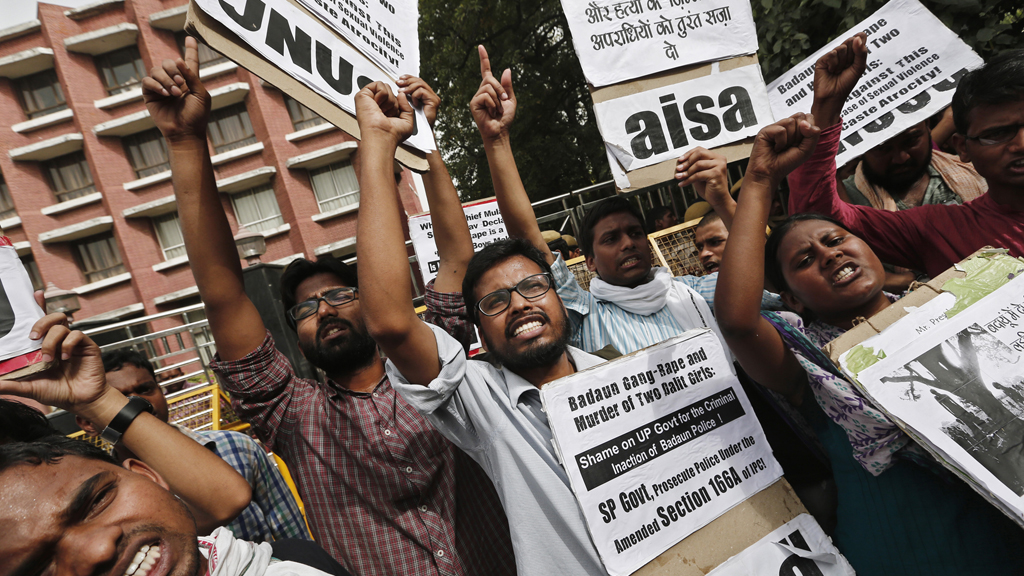Words but not action: failing to end India’s rape crisis
The rape and murder of two girls in India show how official words have not translated into action to address issues of sexual violence and poverty, Human Rights Watch tells Channel 4 News.
Warning: this page contains an image, which has been blurred, but that some may still find upsetting.
The cousins, aged 14 and 15, were found hanged from a mango tree in Uttar Pradesh’s Budaun district in India on Wednesday morning. The girls had gone missing the night before after leaving home to use the toilet.
A post-mortem has confirmed the girls, from the low-caste Dalit community, had been raped before they were killed by hanging.
What would have happened if these girls had been from a more powerful family? Meenakshi Ganguly, Human Rights Watch
Two men have been arrested on suspicion of raping and murdering the girls. Police said they are searching for a third man.

The victims’ families say the girls were gang-raped and hanged by five men (pictured, right). They have also accused the police of being complicit in protecting the men, as they refused to take action when the girls were first reported missing.
They say it was only after angry villagers found the bodies and took them to a nearby highway and blocked it in protest, say the families, that police registered a case of rape and murder.
It is understood that two police officers have also been arrested, charged with conspiracy, as well as suspended.
Caste discrimination
But the case has shone a light on the way females, children, and those of a “lower-caste” are treated in India.
Meenakshi Ganguly, South Asia director at Human Rights Watch, told Channel 4 News that the incident has only been investigated after news what had happened spread on social media, leading to public outrage.
“It reflects how the government saying for years that this kind of caste discrimination must end hasn’t functioned,” she said, speaking from Mumbai.
“What would have happened if these girls had been from a more powerful family? The likelihood of people taking action would have been much higher – their complaint would have been treated as more serious.”
‘Tip of the iceberg’
On Friday students took to the streets to protest about increases in rapes of Dalit women (pictured, top).
It reflects poorly on the Indian economy that its growth has not translated into a toilet for these girls. Meenakshi Ganguly
Unicef has reported that nearly one in every three rapes in India is of a child. In 2011, a total of 24,270 cases of rape were reported – but Unicef says this is the “tip of the iceberg” as fear of social stigmatisation or victimisation prevent many from reporting rapes.
Members of the lower-caste Dalit groups are more likely to be victims, and Ms Ganguly said that rape is sometimes used as a punishment – “as a means to keep people in their place”.
India’s government has laws in place offering greater protection to children and members of the Dalit community.
However, Ms Ganguly says, this incident shows how members of the Dalit community are still being let down by the state.
The governments have failed to send out that message, that strong message. Annie D Raja, activist
“These two girls are among the most marginalised and poor in India,” she said. “They had gone out because they didn’t have a toilet in their house so they had gone to the fields.
“It reflects poorly on the Indian economy that its growth has not translated into a toilet for these girls.”

No strong message
Following the rape of a paramedic in 2012 – an incident that sparked global condemnation – the government introduced mechanisms to speed up the legal process.
However, Ms Ganguly says, though the laws are “pretty progressive”, they are “not being implemented so they end up being useless”.
She said the easy thing for India’s political leadership to do is call for the death or severe punishment of the perpetrators – “that is pretty much what we have always heard”.
The state is not able to respond when these incidents occur. Meenakshi Ganguly
Her sentiments were echoed by Annie D Raja, an activists and general secretary of the National Federation of Indian Women.
Ms Raja said: “Unless and until the governments, central government as well as the state government, show political will and social commitment to see that all those legislations are implemented in letter and spirit; until and unless you implement it properly and give a signal to all those anti-women forces that if you do anything like that then there is a system, that system will not spare us.
“Unfortunately the governments have failed to send out that message, that strong message.”
Difficult job
Ms Ganguly added: “The much more difficult job is institutional reform. The state is not able to respond when these incidents occur.”
She said there needs to be administrative accountability for the poverty and treatment of members of this community “right down to village level”, and that overworked police need to be better trained and provided with better equipment.
“This is an ancient police structure that has existed from colonial times,” she said, adding that the police need to learn that all cases should be treated equally, “no matter how rich or poor the victims are”.